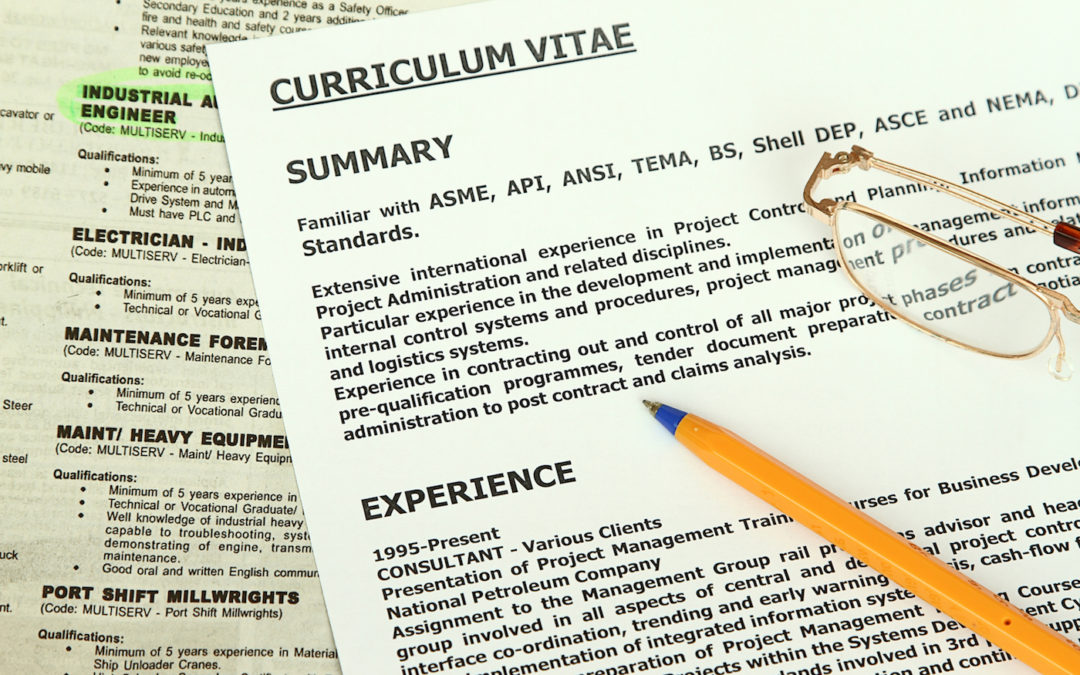
Jun 27, 2017 | Resume Writing Tips
When you’re seeking a C-suite level position, you’ll need to bring more than your resume to the table.
You’ll also need a carefully crafted executive bio that speaks to your ability to perform at this level of leadership.
Though similar to a resume in that it should include some of your background and experience, the bio offers you a chance to truly sell yourself as someone who belongs in a company’s driver’s seat.
Today, we’re taking a look at what makes a great bio, so you can be sure to stand out for all the right reasons.
Ready to get started? Pick up your pen and let’s go!
1. Let Your Voice Be Heard
When creating a resume, you’re working within an organized format — and for good reason. An impressive, clear resume is one of the top five reasons employers hire the people they do.
Thus, though you can be creative to an extent in a resume, your executive bio is the place where more of your personality can shine through.
The bio can include personal anecdotes, moments that defined you as a leader, important events on your career path, and much more. As such, it often takes a more narrative form, allowing you to more easily express your style.
While it’s critical to remain grammatically accurate and professional, your tone should be engaging enough to sustain the reader all the way to the last line.
2. Start Strong
Humans now have an eight-second attention span. As such, it’s more important than ever to catch their eye immediately.
The best way to do this with your executive bio?
Start with your strongest, most compelling recollection. Grabbing them at the onset will help ensure they’ll stick with you — and that you’ll stay on their mind.
3. Think Three-Dimensionally
Sure, employers want to know about your professional interests, your skill sets, and your challenges — and how those translate into company culture and brand identity.
They also want to know who you are when the clock strikes 5:00.
In your executive bio, be sure to leave some room to establish yourself as a three-dimensional person, not just an office professional.
Do you volunteer at a non-profit? Are you involved in your local community? If so, mentioning these activities indirectly speaks to your leadership skills, and your desire to help.
You may also want to include your hobbies, family life, and other interests. When doing so, try to find a way to link them back to the company you’re applying to join.
4. Make it Readable
When you’re finished crafting your bio, print it out and take a look at it. Or, if it’s online, sit back from your computer and examine it.
Is it full of long paragraphs in blocks? If so, make a few formatting changes.
First, break the paragraphs apart where it makes sense, trying to keep each one to just a few sentences.
Then, see if any sections could benefit from subheadings. These can give the reader a head’s up that a new topic is about to be introduced.
Research reveals readers only read between 20% to 28% of the content on a particular web page. Make sure they stick with you for the long haul this time.
Perfecting Your Executive Bio: Start Here
Are you applying for a C-suite level position and need a compelling bio? If so, we’d love to help.
Our career coaches are skilled in helping you get the job you want, and they’ll help formulate the bios that get you there.
We’ll help ensure that your document is the best representation of you, taking into account your career history — and your vision for the future.
Interested in learning more? Feel free to contact us and let’s get started today!

May 24, 2017 | Resume Writing Tips
Whether you’re putting your resume together after an unexpected job loss, exploring a new career or graduating from college, you may be wondering how to develop your resume.
First, read this to avoid common mistakes. Next, you need to put together a list of job skills.
Keep reading to learn 6 job skills employers look for on your resume.
Chief Among Job Skills is Problem-Solving
The bottom line is that an employer is looking for someone to solve a problem — to optimize operational effectiveness, boost its sales, grow new business, repair its image, or manage others to do those things. Otherwise, there would be no job vacancy.
Regardless of your other skills, you will need to orient yourself with the potential employer’s problems.
Organizations value employees who can get things done consistently and on time. If you can handle projects without excuse-laden delay or complaints, this is a great skill to showcase.
Show you can solve problems rather than needing to be rescued from them, and you’re off to a good start!
Organization and Planning
These job skills tend to go hand-in-hand.
Provide examples of a time when you took a voluminous amount of information from multiple sources and seamlessly processed it so that everyone was well-prepared, deadlines were met, and you looked like a genius.
Willingness/Ability to Learn
You don’t want your potential employer to think that you’re not willing to broaden your knowledge base because there’s always new things to learn.
There is a difference between someone who tolerates learning and someone who tackles new projects with fervor. Be in the latter category.
Teamwork
Even if you work from a home office, you won’t be an island.
Teamwork can be broken down into subsets such as dependability, accountability, and communication. The descriptions below are translated into a benefit for your potential employer to help you prepare for your interview.
Being dependable means that you consistently and timely follow through on deliverables.
Accountability means that someone doesn’t have to wince when they ask you to correct something. You eagerly accept an opportunity to improve yourself because you realize it’s not about you.
Good communication means that you ask questions early on and e-mail or speak in a clear, direct way to avoid time-consuming volleying due to misunderstandings.
Multi-Cultural Awareness
Today, employers are looking for professional sensitivity. Your ability to flourish in a multi-cultural environment is critical.
Being a member of a diverse workforce is more than just helping your employer avoid an audience before the EEOC. It’s about your ability to respect the views, ideas, and backgrounds of others.
The Skill That Your Ideal Employer is Looking For
The first five skills are the primary skills that translate across industries. Much of your resume will have universal application and may at most require tweaking.
But leaving a “place-holder” in your resume allows you to showcase something industry-specific or respond to a job description and “ideal candidate” criteria.
If you need some help getting your resume started, click here for samples. If you are overwhelmed by this process, find out whether a resume-writing service is a good option for you today!

May 9, 2017 | Resume Writing Tips
It doesn’t matter how well you interview or how qualified you are if your resume isn’t top-notch. Without a great, attention-grabbing resume, you’ll never make it past the initial application process and get a chance to prove that you’re the perfect candidate for the job. Your resume is your chance to make the best first impression and make it to the next stage of the job screening process. Listed below are 5 major mistakes to avoid on your resume:
Writing a Novel
Hiring managers typically get an overwhelming number of applications for each job opening, but they only spend an average of 6 seconds scanning each resume. If your resume stands out enough during the initial scan to make it to the “maybe” pile, they might spend more time quickly skimming the remainder of your resume. The key thing to remember is that hiring managers are busy, and you can make yourself more appealing by keeping your resume focused, concise, and easy to scan.
If your resume is comprised of long, dense blocks of text, it doesn’t matter how great the material is because chances are no one will read it.
Using Dated Resume Techniques
Hiring managers are looking for candidates who are professional and savvy enough to fit into the modern job market. One way to signal to hiring managers that you’re living in the past is to use old-fashioned, ineffective and dated techniques. These include:
- Mentioning that your references are “available upon request.” This is usually considered a meaningless filler since hiring managers assume this is true of most applicants.
- Busy and cluttered resumes. Clean, concise, and attractive is the name of the game- using a combination of loud fonts and colors is distracting and looks dated.
- A generic and cliched objective like “Professional seeks challenging position.” This doesn’t add value, and it wastes valuable resume real estate.
Being Too Vague
When quickly skimming a resume, it makes sense that hiring managers will be drawn to percentages, specific details, and other metrics, while mostly skipping past vague generalities. Instead of saying you “increased efficiency,” saying something like “increased productivity by an estimated 20%, boosting revenue by $500K annually” is much more impressive and effective.
Exaggerating Your Qualifications
56% of hiring managers have discovered lies and embellishments on resumes, and anecdotally many hiring managers say they would rather hire an honest candidate with potential and limited experience than someone who exaggerates. When applying for a job you’re excited about, it makes more sense to emphasize your qualifications and transferrable skills (something an experienced resume writer is great at) than to overstate your experience and risk getting caught.
Even if your embellishments are missed, you run the risk of starting a job you’re not qualified for, and being placed in the anxiety-inducing situation of pretending to have skills you don’t possess. It’s best to be truthful, as exaggerating or lying is never worth it.
Submitting a Sloppy Resume
No matter the position or industry, chances are hiring managers are looking for candidates who pay great attention to detail and quality. The best way make a great first impression is to submit a resume that’s free of grammatical errors and typos, clean and visually appealing in layout and format, and reads well.
If you want to avoid these five major mistakes, consider hiring a professional resume writer who’s skilled and familiar with your industry. Contact me today to discuss your job search and career goals, and to learn more about Elite’s interview-winning resume and cover letter packages.

Mar 27, 2017 | Resume Writing Tips
Your resume and cover letter are what get you in the door in this increasingly competitive job market. During your job search, you may be tempted to write your resume and other career-related content, but this is usually a mistake. Investing in a professionally written resume can quickly position you ahead of competitors, catch the eye of the right hiring manager, and drastically reduce your job-search time. Here are five reasons why you need a professional resume:
You Resume is a Critical First Impression
For the average job announcement, a hiring manager will receive 100-200 resumes, and significantly more for in-demand jobs. 75% of those applicants will be dismissed based on a quick precursory glance of their resume, without ever landing an interview.
This is why it’s so critical that your resume is polished, concise, well-written, easily scannable, up-to-date, and clearly positions you as the best candidate for the job. That’s a lot to accomplish in a 1-2 page document, which is why you need to hire a professional resume writer.
Professional Resume Writers Create Complementary Documents
Your resume, cover letter, and LinkedIn profile (as well as additional documents like an executive biography and reference dossier) should complement and strengthen each other. A professional resume writer will make sure each document and social media profile are congruent.
Professional Resume Writing is an Art
It takes more than just being a decent writer to develop an interview-winning resume. Professional resume writing is an art that requires training, practice, and expertise. Your professionally crafted resume will flow well, get to the point quickly, highlight your unique skills and experience, and make a great impression in 6 seconds. A qualified resume writer knows how to present your skills in the most polished manner possible, in a way that your friend who likes to write for fun simply will not be able to do.
Your Resume Investment Will Yield Significant ROI
When choosing to invest in your career advancement, it’s smart to consider the potential return on investment (ROI). When you hire a professional resume writer, you won’t spend nearly as long looking for a job, which is worth its weight in gold if you are unemployed. If you’re interested in a job that is more lucrative than your current job, your new resume will pay for itself in no time. Since professionally written resumes are more effective, you can rest easy knowing you won’t have to waste months applying to countless jobs.
A Professional Resume Will Pass Scanning Software
These days, more hiring managers are using keyword-scanning software to screen resumes. A professional resume will carefully investigate your targeted jobs, noting the most prevalent and important keywords. Afterward, they will incorporate these keywords into your resume smoothly so that you can get pass the scanning software, but keep in mind your resume still reads well. If you try to incorporate keywords yourself, the wording may be awkward and obvious. This is another key difference between an amateur and a professional who is current on best practices in resume writing.
When it comes down to it, a professionally crafted resume, cover letter, and LinkedIn profile will help you stand out from the competition. When you’re ready to launch your career-search campaign, be sure to check out our wide range of resume and coaching packages.

Feb 9, 2016 | Resume Writing Tips
When it comes to resumes and cover letters―first impressions are everything―as hiring managers only spend a few seconds during the initial screening process. If you can make your resume and cover letter stand out lightning fast, your chance of getting an interview greatly increases. Today, let’s discuss several resume and cover letter tips to make you stand out. (more…)

Feb 2, 2016 | Resume Writing Tips
When you want your resume to show potential employers that you are their top candidate, it’s important to know which resume format to use for your career search campaign. After all, you only have six to eight seconds to grab the attention of a hiring manager or recruiter. So what is the best resume format? Does format really matter? Can you get it wrong? (more…)






